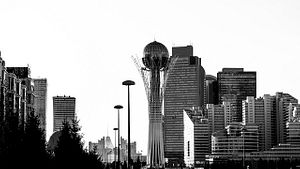To the eye of a first-time visitor, the giant concrete T-shaped pillars and sparse cranes alongside the road connecting the airport to the center of Nur-Sultan, Kazakhstan’s capital, could appear to be just another work-in-progress project in a city famous for its glitzy architecture. But for those in the know, they have become a symbol of corruption, failed investments, and financial trouble.
In 2011, Kazakhstan was preparing for celebrations of it 20th independence anniversary and new projects were mushrooming. For independence day in December, the government would unveil a Triumphal Arch on the road connecting the center of the capital city to the airport.
In July 2011, for the “city’s birthday,” which coincided with then-President Nursultan Nazarbayev’s birthday, a new futuristic project was launched in Astana, as Nur-Sultan was then called. A new Light Rail Transit (LRT) system would connect the main hotspots of the capital and decongest the traffic that has plagued the urban center since it became the seat of the government in 1997.
The LRT was planned with the interest of major international investment banks and would cost around $1.5 billion. Once the plan was finalized in 2014, the construction task was assigned to a Chinese contractor, with funding from the China Development Bank, turning the LRT into a project within the aegis of Beijing’s Belt and Road Initiative (BRI).
By the time the Specialized EXPO was to be held in Astana in 2017, the LRT should have been built and functioning, just like the multi-billion dollar Abu Dhabi Plaza skyscraper complex in the center of the city. Four years after the planned completion date, Abu Dhabi Plaza is nearing the final stages – though in a less grandiose fashion – while construction work at the LRT has timidly resumed after being halted for nearly two years.
According to the mayor’s office of Nur-Sultan, in 2018 China Development Bank was disgruntled that $258 million of the $313 million it had provided to Astana LRT was not spent on the project. Instead, the funds had been wrongfully deposited at Astana Banki, a troubled lender that would default in late 2018, leading China Development Bank to halt funding.
In April 2019, newly-elected President Kassym-Jomart Tokayev suspended construction work on the LRT pending investigations into the alleged corruption and the search for new funding sources.
In October 2021, after a long trial, the appeals court overturned the first-degree sentence against seven public officials and managers, releasing them from the charges.
Before the sentence, lawyer Jokhar Utebekov said in a Facebook post that the seven had become “scapegoats” in a case much bigger than them.
Two of the main suspects, who were tried in a different court, have left the country and are currently wanted, although notably are not on the international wanted list.
The main figure is Kanat Sultanbekov, who served as vice mayor of the capital in 2009-2014. Sultanbekov was sentenced in 2017 to 10 years in prison – later replaced with a $5.5 million fine – for having taken bribes in his previous post as manager at state-controlled Kazakh Engineering.
Sultanbekov, said to be close to former mayor of the capital, Imangali Tasmagambetov, left the country as he was facing trial, while Tasmagambetov was sent to Russia as Kazakhstan’s new ambassador. The timing suggested that Sultanbekov may have received “safe passage” while his protector had to face “demotion” to Moscow.
People familiar with the issue, however, told The Diplomat that the spotlight was turned onto Sultanbekov and Tasmagambetov in an effort to protect members of Nazarbayev’s family, who are rumored to have profited from the deal.
Another major actor in the scheme, according to the prosecutor, could have been Talgat Arden, then-CEO of Astana LRT, the company set up in 2011 to carry out the construction of the project.
According to the prosecution, Sultanbekov and Arden were the masterminds behind the criminal group, which allegedly included the previously-mentioned seven, that stole public funds from the LRT budget.
Today, the Astana LRT company has changed name to City Transportation Systems and needs a substantial injection of funds to carry out the construction. In addition, while Kazakhstan’s government has since paid back part of the loan it received from China Development Bank, it is unclear just how much remains to be paid.
The capital’s mayor, Altai Kulginov, said on October 15 that there will be financial support from one of Kazakhstan’s lenders.
“One of [the country’s] banks agreed [to finance the project]. We will say more once the agreement is signed,” Kulginov told the press.
While construction work has resumed, the frequent visitor to Nur-Sultan knows that the LRT is still a pipe dream that might never be completed.

































